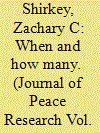| Srl | Item |
| 1 |
ID:
153819


|
|
|
|
|
| Summary/Abstract |
Despite the popularity of using games to teach international relations, few works directly assess their effectiveness. Furthermore, it is unclear if games help all students equally, or if certain students are more likely to benefit than others. Finally, how closely the game must mirror the concept being taught to be an effective pedagogical tool has received scant attention. We address these points by discussing the use of an updated version of the classic American election game, Consensus, to help illustrate the role of domestic political coalitions in an international political economy course. Assessing the performance of 39 students via a pre- and post-quiz, we find that student performance improved overall, particularly among frequent gamers.
|
|
|
|
|
|
|
|
|
|
|
|
|
|
|
|
| 2 |
ID:
152099


|
|
|
|
|
| Summary/Abstract |
Understanding why and when states militarily intervene in civil wars is crucial. Intervention can increase civil wars’ severity and the strategies employed in civil wars are shaped by the possibility of military intervention. This article argues that potential military interveners react to information revealed about warring parties’ intentions and relative power. Without revealed information, potential military interveners are unlikely to reconsider their initial decision to remain out of the war. Revealed information causes non-belligerent states to update their expectations about the trajectory of the civil war causing them, at times, to change their calculus about the benefits of belligerency and thus intervene. This helps explain why civil wars spread and when they do so. This explanation is tested using generalised estimating equations on a new data-set of unexpected events for the civil wars in the Correlates of War Intrastate War and PRIO Armed Conflict data-sets.
|
|
|
|
|
|
|
|
|
|
|
|
|
|
|
|
| 3 |
ID:
146240


|
|
|
|
|
| Summary/Abstract |
This article argues that private information plays an important role in explaining long wars. Existing rationalist explanations of long, intensely fought wars focus on commitment problems rather than private information as the cause of such wars. Commitment-problem explanations of long wars claim that while private information can explain short wars, battles and exchanges of offers for settlement should quickly reveal private information, thereby leading to an early peace. Commitment problems, on the other hand, may take years to resolve and therefore can explain long, intense wars for unitary actors. However, while commitment problems are an important explanation for long wars, private information can endure deep into lengthy conflicts because states create new private information during wars and because states often disagree about their relative ability to bear costs rather than their relative military capabilities. I explore this argument in cases on the end of the First World War and the Iran–Iraq War.
|
|
|
|
|
|
|
|
|
|
|
|
|
|
|
|
| 4 |
ID:
112779


|
|
|
|
|
| Publication |
2012.
|
| Summary/Abstract |
What makes some wars longer and more severe than others is an important question in international relations scholarship. One underexplored answer to this question is the role that third party joiners play in lengthening conflicts, especially those states that intervene militarily after a war's initial stages. This article argues that late joining complicates bargaining by adding new issues to the war and increases uncertainty about the relative balance of forces. Thus, more information will be needed to resolve the bargaining impasse. This means additional fighting and a longer war. This lengthening in turn increases the number of casualties. This is a distinct process from simply having more participants in a war from the outset as those participants would not add uncertainty in the same way that late joiners do since questions about how those participants affect the relative balances of forces would be answered just as quickly as if there were only two participants at the outset. These claims are supported by a non-proportional hazards model regression, a Cox proportional hazards regression, and an ordinary least squares regression using the Correlates of War interstate war dataset.
|
|
|
|
|
|
|
|
|
|
|
|
|
|
|
|